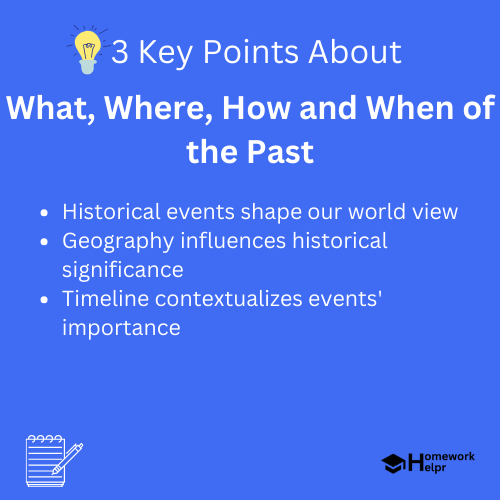📝 Summary
The concept of the past encompasses our history, culture, and humanity’s evolution. Understanding this entails answering fundamental questions: what happened, where it occurred, how it unfolded, and when these events took place. Each aspect reveals critical insights into significant events like the American Revolution and the Industrial Revolution. Geography and chronology play crucial roles in the events’ consequences and relevance. By exploring the past, individuals gain knowledge that enriches their perspective and understanding of humanity and its future.
Understanding the Past: What, Where, How, and When
The concept of the past is not just a mere collection of events that happened; it encapsulates our history, culture, and the evolution of humankind. To comprehend the past, we dive deep into four fundamental questions: what happened, where it occurred, how it unfolded, and when these events took place. This exploration leads us to a better understanding of our present and future. Let‚’ dissect each of these questions to glean their significance and imprint.
What Happened in the Past?
The term “what” refers to the historical events that have shaped our world. These events include wars, revolutions, discoveries, and the rise and fall of civilizations. For instance, the American Revolution was a crucial event where thirteen American colonies fought to gain independence from British rule. Not only did it change the political landscape, but it also established democratic values that resonate to this day.
- The Industrial Revolution – This period marked significant technological advancements.
- The French Revolution – A major turning point in France that ignited feelings of liberty
- The Discovery of America – Christopher Columbus‚’ voyage that opened the Americas to European exploration.

Definition
Event: An occurrence, especially one that is noteworthy or has a specific effect. Civilization: A complex society characterized by elements such as urban development, social stratification, and cultural achievements.
Examples
For example, the invention of the printing press revolutionized information access and education during the Renaissance period.
Where Did These Events Occur?
Geography plays a vital role in shaping history. The where of historical events can often provide insight into their importance and consequences. Events that took place in strategic locations influenced commerce, warfare, and culture. For instance, the ancient city of Rome served as the heart of the Roman Empire and is still a significant point of interest today.
- The Nile River – The cradle of Ancient Egyptian civilization.
- Battlefields – Locations like Gettysburg had critical historical implications.
- Trade Routes – Silk Road was essential for cultural and commercial exchange.
Definition
Geography: The study of places and the relationships between people and their environments. Commerce: The activity of buying and selling, especially on a large scale.
Examples
For instance, the Battle of Hastings in 1066 took place in England, playing a crucial role in Norman dominance.
How Did These Events Unfold?
The “how” delves into the processes and actions that precipitated historical outcomes. Understanding the tactics, decisions, and innovations that characterized these events can provide a valuable lens through which to analyze human behavior. For example, the how behind the American Civil War involved issues such as slavery, economic disparities, and states‚Äô rights, which were pivotal in igniting conflict.
- Technological advancements – Innovations that changed warfare methods.
- Political maneuvering – Strategies leaders took to consolidate power.
- Social movements – The role of grassroots activism in effecting change.
❓Did You Know?
The word “history” comes from the Greek word “histor√≠a,” which means “inquiry” or “knowledge acquired by investigation.” This highlights the essence of studying and learning about the past!
Definition
Tactics: An action or strategy carefully planned to achieve a specific end. Groundroot activism: Local movements that organize from the bottom up, focusing on community needs.
Examples
A prime example is the use of the telephone during World War I, which revolutionized communication strategies on the battlefield.
When Did These Events Take Place?
The when aspect relates to the timeline of historical events, which helps us contextualize their significance. Understanding the chronological order provides a framework for grasping how one event may lead to another. For example, World War I began in 1914 and ended in 1918, paving the way for social and political changes that eventually led to World War II.
- Ancient Times: Events that shaped early human civilization.
- Middle Ages: A period of feudalism, kingdoms, and religious influence.
- Modern Era: The age of revolutions, industrialization, and globalization.
Definition
Chronological: Arranged in the order of time of occurrence. Feudalism: A social system prevalent in medieval Europe where land was held in exchange for service.
Examples
For instance, the invention of the steam engine in the late 18th century significantly transformed transportation and industry in the 19th century.
Conclusion
The past is a vast ocean of knowledge, lessons, and insights. By exploring what happened, where those events took place, how they unfolded, and when they occurred, students and children gain a clearer perspective on how history impacts their lives today. Understanding these four critical aspects allows us to enrich our understanding of humanity and encourages critical thinking skills for future endeavors. As history continues to evolve, it remains integral to shaping our identity and guiding our progress.
Related Questions on What, Where, How and When of the Past
What is the significance of understanding the past?
Answer: It provides insights into humanity’s evolution.
How do historical events shape our culture?
Answer: They influence societal values and norms.
Why is geography important in history?
Answer: It determines the context of events and their impact.
What role does chronology play in understanding history?
Answer: It helps in understanding causality between events.
